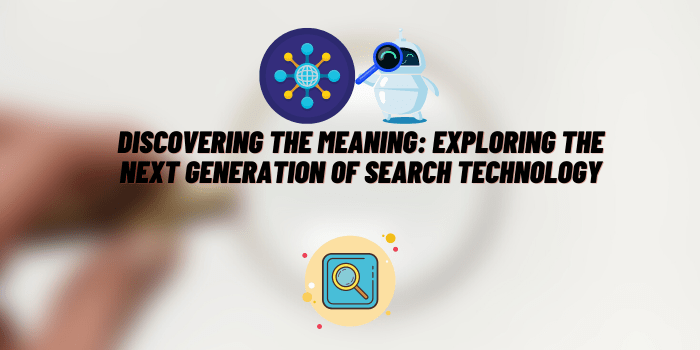Discovering the Meaning: Exploring the Next Generation of Search Technology
In today’s digital age, search technology has become an integral part of our daily lives. Whether we’re looking for information, products, or services, search engines help us navigate the vast online landscape.
As technology continues to advance, search engines are evolving to provide more intelligent and relevant results. One such advancement is semantic search, a next-generation search technology that aims to understand the meaning behind our queries and deliver more accurate and contextually relevant results.
Understanding Semantic Search

Semantic search goes beyond traditional keyword matching by focusing on the intent and context of the search query. It aims to understand the meaning of words, phrases, and concepts and provide results that align with the user’s intent. By leveraging natural language processing (NLP) and machine learning algorithms, semantic search can deliver more accurate and personalized results, making the search experience more efficient and satisfying for users.
The Role of Artificial Intelligence
Artificial intelligence (AI) plays a significant role in powering semantic search capabilities. AI algorithms analyze vast amounts of data, learn from user behavior, and continuously improve search results. Natural Language Processing (NLP) enables search engines to understand and interpret human language, including synonyms, context, and user intent. With AI, search engines can provide more nuanced and contextually relevant results, improving the overall search experience.
Semantic Search Applications
Semantic search has applications across various industries and use cases. In web search engines, semantic search enhances the accuracy and relevance of search results, helping users find the information they need more efficiently. In e-commerce, semantic search enables better product discovery by understanding user preferences, generating relevant recommendations, and improving the overall shopping experience. Semantic search also powers voice assistants and virtual agents, enabling conversational search and natural language interactions.
Improving User Experience

One of the key benefits of semantic search is its ability to enhance user experience. By understanding user intent and context, search engines can provide more accurate and relevant results. Semantic search reduces the reliance on exact keyword matches, allowing users to find what they’re looking for even if they use different words or phrases. It also enables conversational search, where users can ask questions more naturally and conversationally. Additionally, semantic search helps reduce information overload by providing intelligent filtering options based on user preferences and context.
Challenges and Future Developments
While semantic search brings numerous benefits, it also poses challenges. Privacy and ethical considerations arise as search engines strive to understand user intent and deliver personalized results. Language and cultural barriers present challenges in implementing semantic search across diverse regions and languages. However, ongoing advancements in AI and NLP are addressing these challenges and paving the way for a more inclusive and globally applicable semantic search technology.
Implementing Semantic Search

Implementing semantic search requires businesses and website owners to focus on optimizing their content and understanding user intent. Here are some key strategies for effectively implementing semantic search:
- Structured Data: Implement structured data markup, such as Schema.org, to provide search engines with clear and organized information about your content. This helps search engines understand the context and structure of your web pages, improving the relevance of search results.
- Natural Language Optimization: Optimize your content for natural language queries and conversational searches. Instead of relying solely on specific keywords, create content that answers common questions and addresses user intent. Incorporate long-tail keywords and phrases that align with the way people naturally speak or type their queries.
- Descriptive Meta Tags: Use descriptive and informative meta tags, including title tags and meta descriptions, to provide concise summaries of your web pages. These tags should accurately represent the content and incorporate relevant keywords that reflect user intent.
- User-Intent Optimization: Understand the intent behind different search queries and optimize your content accordingly. Focus on providing comprehensive and relevant information that satisfies user needs. Consider the different stages of the buyer’s journey and tailor your content to address specific user intents, such as informational, navigational, or transactional queries.
- User Experience Optimization: Ensure your website offers a seamless and user-friendly experience. Improve website navigation, load times, and mobile responsiveness to enhance the overall user experience. Provide clear and intuitive site architecture that allows users to easily find the information they’re seeking.
- Content Optimization: Create high-quality, informative, and engaging content that adds value to users. Incorporate relevant keywords naturally within your content, but avoid keyword stuffing. Use heading tags (H1, H2, etc.) to structure your content and make it easier for search engines to understand.
- Monitor and Adapt: Regularly monitor the performance of your website and search rankings. Analyze user behavior, engagement metrics, and search queries to gain insights into user intent and preferences. Use this data to refine your content and optimize your website continually.
Conclusion
Semantic search represents the next generation of search technology, aiming to understand the meaning behind our queries and deliver more accurate and contextually relevant results. By harnessing the power of AI and NLP, semantic search enhances the search experience, providing users with more precise information, personalized recommendations, and efficient interactions. As semantic search continues to evolve, businesses and website owners should embrace this technology to enhance user experiences, drive engagement, and stay ahead in the ever-evolving digital landscape.






